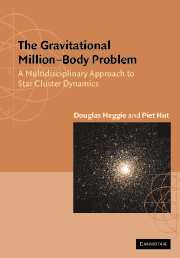Book contents
- Frontmatter
- Contents
- Preface
- PART I INTRODUCTIONS
- PART II THE CONTINUUM LIMIT: N → ∞
- PART III MEAN FIELD DYNAMICS: N = 106
- PART IV MICROPHYSICS: N = 2
- PART V GRAVOTHERMODYNAMICS: N = 106
- PART VI GRAVITATIONAL SCATTERING: N = 3
- PART VII PRIMORDIAL BINARIES: N = 4
- PART VIII POST-COLLAPSE EVOLUTION: N = 106
- 27 Surviving Core Collapse
- 28 Gravothermal Oscillations
- 29 Dissolution
- PART IX STAR CLUSTER ECOLOGY
- Appendix A A Simple N-Body Integrator
- Appendix B Hints to Solution of Problems
- References
- Index
27 - Surviving Core Collapse
Published online by Cambridge University Press: 05 June 2012
- Frontmatter
- Contents
- Preface
- PART I INTRODUCTIONS
- PART II THE CONTINUUM LIMIT: N → ∞
- PART III MEAN FIELD DYNAMICS: N = 106
- PART IV MICROPHYSICS: N = 2
- PART V GRAVOTHERMODYNAMICS: N = 106
- PART VI GRAVITATIONAL SCATTERING: N = 3
- PART VII PRIMORDIAL BINARIES: N = 4
- PART VIII POST-COLLAPSE EVOLUTION: N = 106
- 27 Surviving Core Collapse
- 28 Gravothermal Oscillations
- 29 Dissolution
- PART IX STAR CLUSTER ECOLOGY
- Appendix A A Simple N-Body Integrator
- Appendix B Hints to Solution of Problems
- References
- Index
Summary
The last eight chapters, dealing as they have done with interactions between only three or four stars, might seem a long digression away from the subject implied by the title of this book. Yet we shall see, as we take up the thread of the million-body problem where we broke off at the end of Chapter 18, that an understanding of the behaviour of few-body systems is crucial in following the evolution of the system through core collapse and beyond.
We left the system rushing towards core collapse, its central density rising inexorably, so that it would reach infinite values in finite time. How is this catastrophe averted? In fact there is no shortage of choices, for at least five different mechanisms have been proposed over the years. Admittedly, two are rather out of favour at present: a central black hole (e.g. Marchant & Shapiro 1980), or runaway coalescence and evolution of massive stars (Lee 1987a, and Problem 1). The other three involve binary stars in one guise or another, and it is not hard to see why this is attractive. After all, the mechanism responsible for core collapse is a two-body one (Chapter 14). Therefore it is clear that higher-order interactions, which we have neglected so far, might in principle eventually compete with two-body relaxation when the density becomes high enough. And three-body interactions can create binaries (Chapter 21 and Fig. 27.1).
- Type
- Chapter
- Information
- The Gravitational Million–Body ProblemA Multidisciplinary Approach to Star Cluster Dynamics, pp. 254 - 262Publisher: Cambridge University PressPrint publication year: 2003

